Toyota Yaris VS Volvo EX90 – Specs, Efficiency & Price Comparison
Find out now which car fits your needs better!
The Toyota Yaris (Hatchback) is powered by a Full Hybrid or Petrol engine and comes with a Automatic or Manuel transmission. In comparison, the Volvo EX90 (SUV) features a Electric engine and a Automatic gearbox.
When it comes to boot capacity, the Toyota Yaris offers 286 L, while the Volvo EX90 provides 310 L – depending on what matters most to you. If you’re looking for more power, you’ll need to decide whether the 280 HP of the Toyota Yaris or the 517 HP of the Volvo EX90 suits your needs better.
There are also differences in efficiency: 3.80 L vs 19.90 kWh. In terms of price, the Toyota Yaris starts at 21900 £, while the Volvo EX90 is available from 71700 £.
Compare all the key specs now and find out which model fits your lifestyle best!
Toyota Yaris
The Toyota Yaris exudes a charming blend of practicality and style, making it an appealing choice for urban drivers. Its compact design allows for easy manoeuvrability in crowded city streets, while the interior offers a surprisingly spacious and comfortable environment. With a focus on fuel efficiency and reliability, the Yaris remains a popular option for those seeking a balance between performance and economy.
details @ Toyota
@ Toyota
 @ Toyota
@ Toyota
Volvo EX90
The Volvo EX90 represents a new era of luxury electric vehicles, combining sophisticated design with cutting-edge technology. Its interior offers a serene environment, enhanced by premium materials and a state-of-the-art infotainment system that ensures both comfort and connectivity. Safety remains paramount, with the EX90 featuring advanced driver assistance features to provide peace of mind on every journey.
details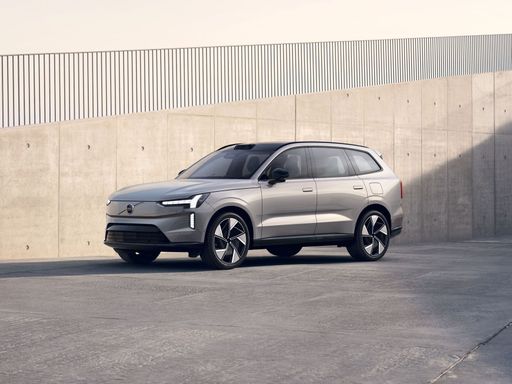 @ media.volvocars.com
@ media.volvocars.com
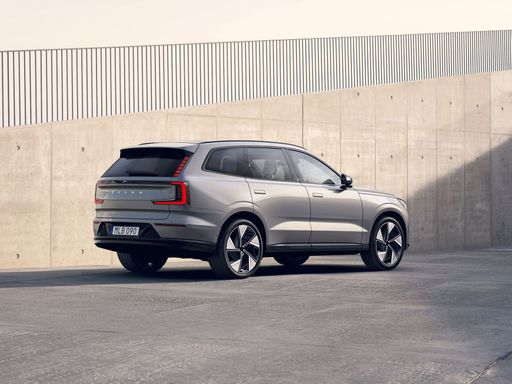 @ media.volvocars.com
@ media.volvocars.com
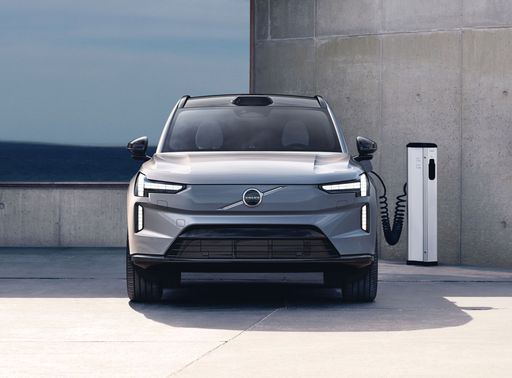 @ media.volvocars.com
@ media.volvocars.com
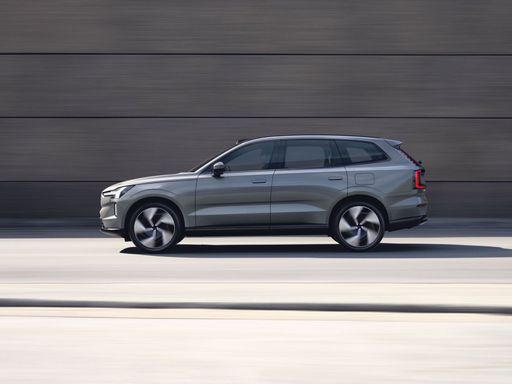 @ media.volvocars.com
@ media.volvocars.com
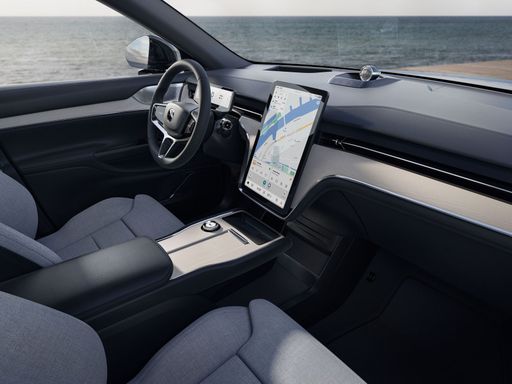 @ media.volvocars.com
@ media.volvocars.com
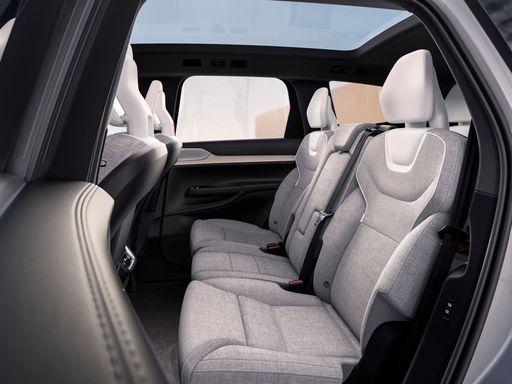 @ media.volvocars.com
@ media.volvocars.com

|

|
|
|
|
Costs and Consumption |
|
|---|---|
|
Price
21900 - 45000 £
|
Price
71700 - 92100 £
|
|
Consumption L/100km
3.8 - 9.5 L
|
Consumption L/100km
-
|
|
Consumption kWh/100km
-
|
Consumption kWh/100km
19.9 - 20.8 kWh
|
|
Electric Range
-
|
Electric Range
580 - 614 km
|
|
Battery Capacity
-
|
Battery Capacity
101 - 107 kWh
|
|
co2
87 - 215 g/km
|
co2
0 g/km
|
|
Fuel tank capacity
36 - 50 L
|
Fuel tank capacity
-
|
Dimensions and Body |
|
|---|---|
|
Body Type
Hatchback
|
Body Type
SUV
|
|
Seats
4 - 5
|
Seats
5 - 6
|
|
Doors
3 - 5
|
Doors
5
|
|
Curb weight
1090 - 1356 kg
|
Curb weight
2579 - 2787 kg
|
|
Trunk capacity
141 - 286 L
|
Trunk capacity
310 L
|
|
Length
3940 - 3995 mm
|
Length
5037 mm
|
|
Width
1745 - 1805 mm
|
Width
1964 mm
|
|
Height
1455 - 1500 mm
|
Height
1744 mm
|
|
Payload
289 - 525 kg
|
Payload
421 - 611 kg
|
Engine and Performance |
|
|---|---|
|
Engine Type
Full Hybrid, Petrol
|
Engine Type
Electric
|
|
Transmission
Automatic, Manuel
|
Transmission
Automatic
|
|
Transmission Detail
Schaltgetriebe, Automatikgetriebe
|
Transmission Detail
-
|
|
Drive Type
Front-Wheel Drive, All-Wheel Drive
|
Drive Type
Rear-Wheel Drive, All-Wheel Drive
|
|
Power HP
116 - 280 HP
|
Power HP
279 - 517 HP
|
|
Acceleration 0-100km/h
5.5 - 9.7 s
|
Acceleration 0-100km/h
4.9 - 8.4 s
|
|
Max Speed
175 - 230 km/h
|
Max Speed
180 km/h
|
|
Torque
390 Nm
|
Torque
490 - 910 Nm
|
|
Number of Cylinders
3
|
Number of Cylinders
-
|
|
Power kW
85 - 206 kW
|
Power kW
205 - 380 kW
|
|
Engine capacity
1490 - 1618 cm3
|
Engine capacity
-
|
General |
|
|---|---|
|
Model Year
2024 - 2025
|
Model Year
2024
|
|
CO2 Efficiency Class
B, G
|
CO2 Efficiency Class
A
|
|
Brand
Toyota
|
Brand
Volvo
|
Toyota Yaris
Introducing the Next-Gen Toyota Yaris: A Blend of Innovation and Technology
The Toyota Yaris has long been lauded for its efficiency, reliability, and practicality. As we venture into the 2024 model year, Toyota has upped the ante with the latest versions of this popular hatchback, melding cutting-edge technology with eco-conscious design. Here’s an in-depth look at what makes the current Yaris line-up stand out from the crowd.
Efficient Powertrains: Hybrid and Beyond
Spearheading the technological innovation in the Yaris range is the introduction of various hybrid models. The Yaris offers a 1.5-litre full-hybrid engine, marrying a petrol engine with an electric motor to produce between 116 and 130 PS. This power blend is controlled via a sophisticated CVT-gearbox, optimizing both performance and fuel efficiency, with consumption figures ranging from an impressive 3.8 to 4.2 litres per 100 km.
For those seeking pure performance, the GR Yaris variants provide a turbocharged 1.6-litre engine capable of producing 280 PS. This power is delivered via a choice of manual or automatic transmission, giving drivers the tactile involvement or convenience they desire.
Design that Fulfils and Inspires
The Yaris hasn't forgotten its roots as a compact, city-friendly hatchback, measuring between 3,940 and 3,995 mm in length. With its bold front grille, sleek lines, and a choice of striking colours, it's a car that turns heads while remaining perfectly suited for urban environments.
The interior is equally impressive, designed with a focus on driver convenience and comfort. Depending on the variant, Yaris can offer generous cargo space of up to 286 litres, making it a perfect companion for everyday tasks or weekend escapes.
Technological Integration: The Smart Choice
Toyota's approach goes beyond just improving engine technology; the Yaris is packed with innovative features aimed at enhancing the driving experience. It boasts a suite of advanced safety systems such as lane departure alert, pre-collision system, and adaptive cruise control, ensuring peace of mind on the road.
The infotainment system in the Yaris is designed to keep you connected, offering seamless smartphone integration, a user-friendly interface, and an intuitive navigation system, ensuring that you're always informed and entertained.
The Cost of Innovation
Owning a Yaris is not just about impressive technology; it's also about making economic sense. With a price range between €25,500 and €49,990, and monthly costs spanning from €748 to €1,513, it offers a broad spectrum to suit different budget needs.
Concerned about emissions? You can rest easy knowing that the Yaris boasts a CO2 efficiency class ranging from B to G, thanks to its low emissions output of between 87 to 215 g/km.
Conclusion: The Toyota Yaris Drives the Future
The Toyota Yaris continues to be a strong contender in the compact car segment, pushing boundaries with its innovative full-hybrid systems and performance-oriented GR models. It's a remarkable blend of design, technology, and economy, ensuring it remains a top choice for drivers who demand more from their hatchbacks.
Whether you're seeking the efficiency of a hybrid or the thrill of the GR Yaris, there's a model tailored to your unique driving needs in Toyota's latest Yaris lineup.
Volvo EX90
The New Volvo EX90: A Leap into the Future of Automobiles
The Volvo EX90 marks a significant step forward in automotive technology and design. As part of Volvo's commitment to sustainability and performance, this all-electric SUV combines cutting-edge technology with the brand’s renowned safety and reliability. Let's dive into the technical details and innovations that make the Volvo EX90 a standout in its class.
Performance and Range: Power Meets Efficiency
The Volvo EX90 offers a range of powertrains, catering to various performance preferences. With power outputs ranging from 279 to 517 PS, the EX90 ensures robust driving dynamics regardless of the selected variant. The vehicle's electric efficiency is underscored by consumption figures between 19.9 and 20.8 kWh/100 km, providing an impressive electric range of up to 614 km on a single charge.
The EX90's battery capacity, ranging from 101 to 107 kWh, is harmoniously paired with its drivetrain configurations, available in both rear-wheel and all-wheel drive models. These options allow a balance between efficiency and driving pleasure, with acceleration from 0-100 km/h in as little as 4.9 seconds.
Innovative Technologies for a Safer Drive
Volvo has always been synonymous with safety, and the EX90 is no exception. Equipped with advanced driver assistance systems, the vehicle includes features such as adaptive cruise control, lane keeping assistance, and a 360-degree camera system. These technologies work together to enhance comfort and security on the road.
Moreover, the EX90 utilises LiDAR technology, enabling it to detect and respond to the surrounding environment more accurately. This technology is pivotal in Volvo's ambition to make its cars safer and is a step toward fully autonomous driving.
Interior Elegance: Where Comfort Meets Functionality
The interior of the Volvo EX90 is a sanctuary of luxury and innovation. Available in four different trims, including the Core, Plus, and Ultra variations, it promises comfort and versatility, seating between five and seven passengers.
The cabin features a sleek design with a central touchscreen that integrates Volvo's latest infotainment system, ensuring connectivity and entertainment are at your fingertips. High-quality materials, meticulous craftsmanship, and thoughtful ergonomics create an inviting atmosphere for both driver and passengers.
Sustainability: A Commitment to Reducing Emissions
As part of Volvo’s sustainability mission, the EX90 underscores the brand's goal of reducing its carbon footprint. With zero tailpipe emissions, the EX90 stands as a testament to Volvo’s eco-conscious engineering. The car's CO2 efficiency justifies its A-grade in environmental standards.
Volvo's dedication to sustainable materials is evident in the EX90's interior, where recycled content is seamlessly integrated into its luxurious design, offering an eco-friendly yet sophisticated driving experience.
Conclusion: The Future is Electric
The Volvo EX90 is much more than just an electric vehicle; it's a glimpse into the future of sustainable mobility. By marrying performance with advanced safety features and a commitment to environmental responsibility, the EX90 sets a benchmark for what the modern SUV can be. For drivers looking to invest in a vehicle that's both future-ready and grounded in safety, the Volvo EX90 emerges as a compelling choice.
The prices and data displayed are estimates based on German list prices and may vary by country. This information is not legally binding.
